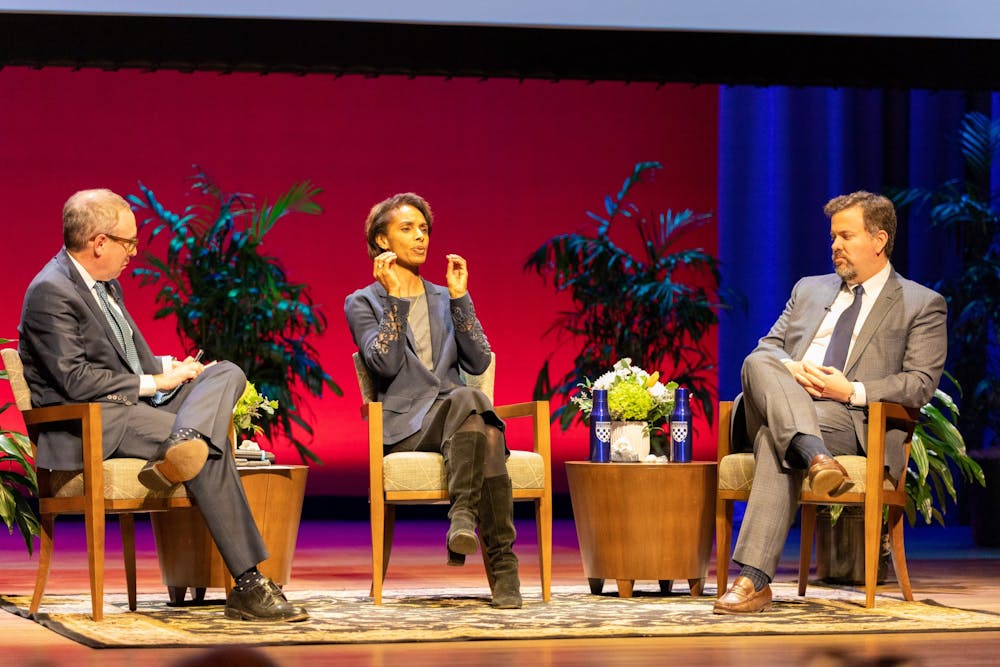Economists Cecilia E. Rouse, chair of the White House Council of Economic Advisers and Michael Strain, director of Economic Policy Studies at the American Enterprise Institute, examined the effects COVID-19 has had on the economics of education as part of the Sharp Viewpoint Series in the Camp Concert Hall on April 19.
As an economist as well as Rouse’s former student and Strain’s former professor, University of Richmond President Kevin Hallock fittingly led the discussion. The event was also available via a live stream for remote viewers and approximately 75 UR students, faculty and community members attended. The Sharp Viewpoint Series is a program that began in 2011 in honor of Richard L. Sharp to facilitate challenging dialogues.
Rouse and Strain discussed the current state of the labor market and predictions for how it will evolve over the next few years. Strain views the current demand for workers in the labor market as far too high, but has a more optimistic outlook for the future, he said.
“The labor market is unhealthily hot because there is an imbalance between business’ desire to find workers and the number of workers out there,'' Strain said. “Until those forces come closer together, which I think they will, I think we’re going to be in a situation where higher wages are fueling inflation.”
While Rouse agreed with most of Strain’s points, she acknowledged that the hot labor market reflected the slower wage growth and benefits offered to workers over the last several decades.
“Employers have to do some rethinking about how they organize their workplaces,” Rouse said. “I think that reflects the unionizing efforts that workers want more of a voice in their workplaces.”
Hallock asked Rouse her thoughts about the effects the COVID-19 pandemic has had on the economic return of education.
Rouse identified two offsetting effects: COVID-19 had increased the opportunity cost for students to pursue an education, leading to a decreased return on investment in schooling, she said. But at the same time, COVID-19 had the biggest impact on jobs that require less education, so those with more education were less likely to lose their jobs, she said.
Rouse and Strain also discussed minimum wage policies.
“Some people propose indexing the minimum wage to local labor market conditions, which I think is very reasonable,” Rouse said.
Strain agreed with Rouse, but also focused on the specific goals of changing the minimum wage policies and who it helped, he said.
“If the goal is to give a big increase in earnings to millions of workers, the minimum wage might be useful,” Strain said. “If the goal is to help the working poor, then the minimum wage is probably not your best tool because it makes it harder for people who are unemployed to get into the workforce.”
Enjoy what you're reading?
Signup for our newsletter
Rouse didn’t fully agree with Strain’s characterization of who is helped and hurt by changes in the minimum wage and acknowledged other possible ways to help lower-income workers, including the Earned Income Tax Credit and job training programs.
Hallock also asked the speakers their views on the effects of immigration on the labor market. Both speakers agreed that immigrants improve the labor market.
“We need immigrants,” Strain said. “One of the worst things from a purely economic perspective the United States can do for our long-term economic health is to hang a sign on the Statue of Liberty that says immigrants are not welcome here.”
Rouse agreed with Strain and acknowledged the importance and specific benefits immigrants offer including enhancing the labor force and bringing innovation, she said.
For anyone hoping to pursue economics as a career, Strain encouraged them to find a mentor and spend time working on research.
Strain said he had been drawn to a career in economics because it both answered how to improve and offered the necessary tools for doing so.
As an economics student, junior Charlie Barnett found the discussion very interesting.
“I enjoyed hearing what they had to say about inflation growth and the effect and how it would work with minimum wage,” he said.
From his personal experience, working in research has aided Strain’s work in economic policy, he said.
“I’ve been lucky to have exposure to both the macro and microeconomic side of things,” Strain said. “These experiences that I've had in research have helped me to take a holistic view of things.”
To close the discussion Hallock praised both speakers for sharing their expertise in economics.
“These two have taught me a lot over the years and both taught me more today and hopefully the people here,” he said.
Contact news writer Katie Castellani at katie.castellani@richmond.edu.
Support independent student media
You can make a tax-deductible donation by clicking the button below, which takes you to our secure PayPal account. The page is set up to receive contributions in whatever amount you designate. We look forward to using the money we raise to further our mission of providing honest and accurate information to students, faculty, staff, alumni and others in the general public.
Donate Now



